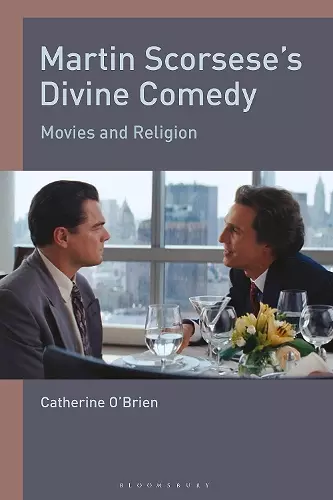Martin Scorsese's Divine Comedy
Movies and Religion
Format:Hardback
Publisher:Bloomsbury Publishing PLC
Published:17th May '18
Currently unavailable, and unfortunately no date known when it will be back

Envisioning Scorsese as a contemporary Dante Alighieri, this book guides the reader through the visions of hell, purgatory and paradise in Scorsese's films.
This book is open access and available on www.bloomsburycollections.com. It is funded by Knowledge Unlatched.
Catherine O’Brien draws on the structure of Dante Alighieri’s Divine Comedy to explore Martin Scorsese’s feature films from Who’s That Knocking at My Door (1967-69) to Silence (2016). This is the first full-length study to focus on the trajectory of faith and doubt during this period, taking very seriously the oft-quoted words of the director himself: ‘My whole life has been movies and religion. That’s it. Nothing else.’ Films discussed include GoodFellas, The Last Temptation of Christ, Taxi Driver and Mean Streets, as well as the more recent The Wolf of Wall Street.
In Dante’s poem in 100 cantos, the Pilgrim is guided by the poet Virgil down through the circles of Hell in Inferno; he then climbs the steep Mountain of the Seven Deadly Sins in Purgatory; and he finally encounters God in Paradise. Embracing this popular analogy, this study envisions Scorsese as a contemporary Dante, with his filmic oeuvre offering the dimensions of a cinematic Divine Comedy.
Drawing on debates at the heart of religious studies, theology, literature and film, this book goes beyond existing explorations of religion in Scorsese’s work to address issues of sin and salvation within the context of wider debates in eschatology and the afterlife.
O’Brien’s text is a welcome contribution and achieves a unique goal in the scholarship on Scorsese, as well as film and religion. This will be an indispensable text for scholars and admirers of Scorsese alike, and it is a case study in how focused religious interpretation of film should be done. One of the highest compliments that can be paid to the author is that the work not only sheds new light on and offers passionate, fresh interpretation of an abundantly studied filmmaker, but the text itself is as engrossing, provocative, and contemplative as the films that are the subject of its investigation. This is sure to be an essential text for course adoption, students, and even general readers, especially if a paperback edition is
made available.
Contains a rich, in-depth analysis of both the film [Silence]’s narrative content and formal aesthetic ... O’Brien’s focused reading of Father Rodrigues’ apostasy as kenosis (pp. 180–91) is exceptional, and reflects what film theology can offer if it takes both cinema and theology seriously. Indeed, theologians and ministers would greatly benefit from reading O’Brien’s book in conjunction with a viewing of Silence. * Theology Journal *
Catherine O’Brien goes beyond merely suggesting that Scorsese was influenced by Catholicism as a child to demonstrate the many ways Catholicism permeates the mise-en-scene, plot, character development, and even editing of his films. There is an immanent theology at work in his films, and O’Brien is an able guide through their cinematic layers. * S. Brent Plate, Visiting Associate Professor of Religious Studies, Hamilton College, USA, and author of Religion and Film: Cinema and the Re-Creation of the World (2017) *
An enriching and innovative inter-disciplinary study, this book draws on debates at the heart of religious studies, theology, eschatology, literature and film. This is an imaginative book which is keen to do something different to existing scholarship on Scorsese. * Chris Deacy, Reader in Theology and Religious Studies, University of Kent, UK *
Passionate, lively, and well researched, Catherine O’Brien’s book synthetically mines Martin Scorsese’s oeuvre -- unpacking with particular aplomb his own Divine Comedy-ripe admission to being, as an artist, “both gangster and priest. * Sheila J. Nayar, Associate Professor of English and Communication Studies at Greensboro College, North Carolina, USA *
The Divine Comedy illustrated and illuminated by Martin Scorsese. The films of Martin Scorsese explored and illuminated by Dante. Much Inferno, some Purgatorio, Hopes for Paradiso. Evoking many cinema experiences and memories by an author who has immersed herself in extraordinary detail of the themes and the director’s film-making - for fans and students alike. And many surprising ah-ah moments. * Peter Malone, Lecturer, University of Divinity, Australia, and President Emeritus of SIGNIS (World Catholic Association for Communication
ISBN: 9781350003279
Dimensions: 236mm x 160mm x 18mm
Weight: 460g
224 pages